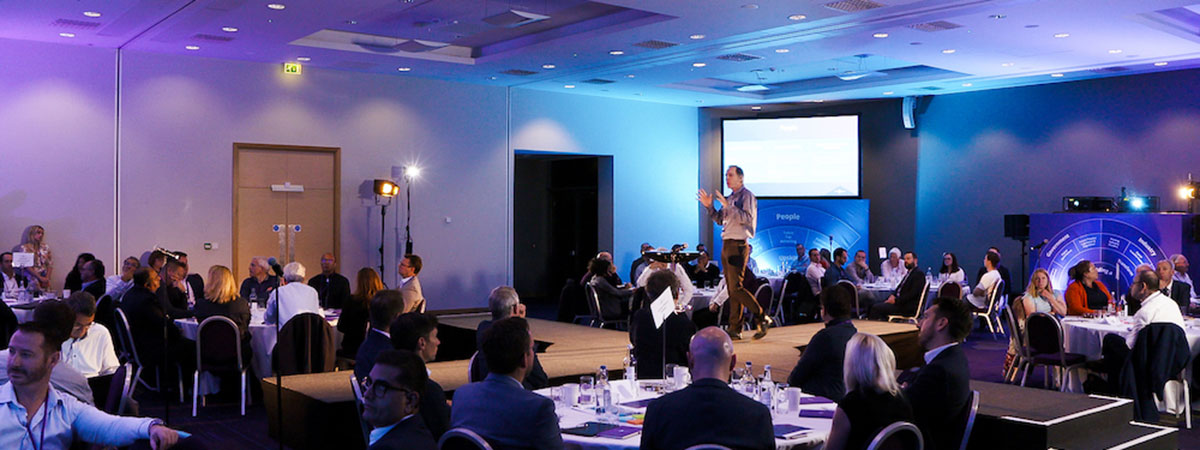Last month, I facilitated a two-day workshop helping to build Digital Jersey. The importance and priority placed on the digital future of Jersey were evident, in the high levels of participation and intense interactions that continued throughout the workshop.
Over 150 people attended across the 2 days, providing a diverse set of views – representing the breadth of Jersey’s communities. As a result, the discussions benefited from a wide range of perspectives that included Government ministers, public sector directors, business leaders, technology specialists, educators, and many more.
Global experts
To frame the working sessions, and offer a global context on the issues to be addressed, Digital Jersey also introduced several global experts into the discussion. They highlighted their experiences, as a guide to seizing the opportunities available to Jersey in its digital journey. Each of these experts expressed their views through a set of challenges they believed were essential to the digital future:

Andy Stanford-Clark, Chief Technology Officer for the UK, discussed the opportunities provided by digital technologies and the role they play in opening up new opportunities. By highlighting the “3 laws of digitization”, Andy emphasized the disruptive impact of digital technologies as they are increasingly adopted.

Phil Male, Chair of the Board of Directors at JT Group, pushed the discussion further by challenging the audience to consider the revolutionary nature of the digital disruptions we face today. He gave several illustrations of where and how digital advances such as AI and quantum computing will reshape how we work and live. And that the impact will be felt sooner than we think.

Dame Wendy Hall is Professor of Computer Science and Executive Director of the Web Science Institute at the University of Southampton. In an interactive interview with the audience, she discussed the key elements of the recently published UK AI strategy and outlined the implications for government policy, industry strategy, and changes to society. In particular, she drew attention to the broad responsibilities that must be addressed with the rapid adoption of AI.

Jaqueline De Rojas, President of techUK and Chair of the Board of Digital Leaders, brought a deeper focus on the skills and education agenda we will require to power the future of our digital world. With particular attention on increasing diversity in the workforce, Jacqueline directed the audience to take a wider perspective on the human aspects at the heart of digital transformation.

Stephen Blackman, Principal Economist at NatWest, gave a critical perspective on the impacts of the Covid pandemic on the economy and the implications for financial institutions. Using the latest data from NatWest, he examined the changing habits and attitudes of consumers over recent months and made a series of predictions on how this might evolve in the near future.
 Alan Brown, Professor in Digital Economy at the University of Exeter. I drew on several recent digital transformation experiences (in large established organisations) to highlight the importance of creating the appropriate mechanisms – and the positive momentum – to drive successful change. I focused on the importance of moving toward a more agile decision-making process, and defining streamlined governance processes as critical to delivering the fast-paced improvements required in digital transformation.
Alan Brown, Professor in Digital Economy at the University of Exeter. I drew on several recent digital transformation experiences (in large established organisations) to highlight the importance of creating the appropriate mechanisms – and the positive momentum – to drive successful change. I focused on the importance of moving toward a more agile decision-making process, and defining streamlined governance processes as critical to delivering the fast-paced improvements required in digital transformation.

Siim Sikkut, Chief Information Officer for the Republic of Estonia, recounted the digital transformation journey that has been happening in Estonia over the last decade. In particular, he talked about the fundamental components that enabled their transformation (eg. digital identity) and highlighted how a focus on collaboration was required across different participants to ensure success.

Radhika Chadwick, a Partner at McKinsey in their Public Sector Practice, reviewed a wide-ranging set of digital transformation examples, which had accelerated over the period of the global pandemic. With reference to these illustrations, she concluded with a list of digital strategy priorities for the next few years.
The key sessions throughout the 2-day workshop were led by these discussions, which inspired conversation across the audience. Inspired by these provocations and the lively interactions that followed, each of the discussion groups reviewed the highlights with the rest of the participants. This sparked a great deal of open and frank exchange of views with respect to how Jersey could accelerate its digital transformation journey for the benefit of its residents, citizens, and businesses.
Important insights
While many topics were addressed over the 2 days, with wide-ranging implications across many areas, initial reflections on the proceedings already allow us to identify several important insights that will be important inputs in refining Digital Jersey strategy:
- A breath of views was expressed across these workshops. Future progress will require significant attention on maintaining an open dialogue to ensure alignment in understanding the opportunities and challenges brought by digital transformation.
- Existing investments in digital infrastructure on Jersey have been significant, with a world-leading gigabit broadband solution in place. This is perhaps not appreciated as a key enabler for driving opportunities across the island and as an important attraction to build new businesses. There is enormous scope to explore new ways to leverage these investments.
- There is an abundance of passion and drive to explore the future of a digital Jersey. Although there may be different motivations and visions for how this future should unfold.
- As people look to the digital future and the journey ahead, there are several important dilemmas that must be faced:
- There is sometimes a rather polarized view about the required pace of change required today. Many see that stability of the island’s way of life should lead to caution in moving too fast and disrupting the values that underpin it. Others see a much more urgent need for change to de-risk potential harms that could result in digital disruption in areas such as financial services, agriculture, tourism, and education.
- Quite rightly, there is a strong emphasis on celebrating Jersey’s heritage and history. However, while looking to the future there is a need to grow to ensure that it remains vibrant and can generate the revenues required to deliver the quality of life so many enjoy. Currently, there are quite different views on the best way to establish an appropriate balance to endure there is a path to sustainable and responsible growth.
These workshops were an important milestone in Jersey’s digital journey. The constructive discussion held across the different communities brought together many different perspectives that will enable Digital Jersey to refine its strategy for driving Jersey forwards into the digital future.






